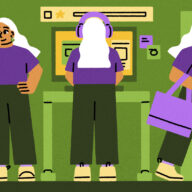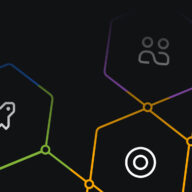“Bossware” boosts productivity – but it comes at a cost
Worker surveillance software isn’t just an invasion of privacy – it’s demoralizing.
What if somebody told you that your boss was using software to track the exact moment you logged onto your computer and knew exactly which websites you visited, who you emailed, and how many keystrokes you logged in a single day? For better or worse, that scenario is fast becoming the norm – particularly for remote teams.
When the pandemic shuttered offices, global demand for these tools skyrocketed, more than doubling in April 2020 alone. In a 2021 survey of 1,250 employers across the U.S., six in 10 said they required remote workers to install surveillance software. Colloquially known as “bossware,” tools like Sneek, Time Doctor, and Hubstaff are just some among a fast-expanding suite of products employers now use to track the workday activity of their remote staffers, capturing web browsing and app use, snapping random screenshots of workers’ computer desktops throughout the day, and blocking certain content. These programs don’t just invade workers’ privacy; they’re demoralizing.
For managers of remote teams, bossware ostensibly stands in for looking over an employee’s shoulder at the office to make sure they’re doing their jobs and not catching up on The Kardashians or solving the day’s Wordle. And, according to bosses, it appears to be working; in the 2021 survey, a whopping 81 percent of the companies that had started using bossware programs said they’d seen increased productivity since. But a growing body of research shows that worker surveillance overwhelmingly backfires in two key ways: they erode a culture of trust and psychological safety, and they kneecap effective and equitable management. To put it another way, spying on workers fosters a toxic environment in which workers are both resentful and unmotivated to do their best work – or to be their best selves.
Spying on workers fosters a toxic environment in which workers are both resentful and unmotivated to do their best work – or to be their best selves.
Earlier this year, a group of management professors published their findings from two separate studies on worker surveillance. They reported that workers who were being digitally monitored were “substantially more likely to break rules” than workers who were empowered to give their all, of their own accord. Spied-on workers were likelier than non-monitored workers to, for example, cheat on assessments, steal or damage company equipment, and purposely work at a slow pace.
Chase Thiel, a management professor at the University of Wyoming and a co-author of the worker surveillance report, says that most workers intrinsically want to do a good job and to play by the rules. That’s because almost everyone has a well-developed sense of personal integrity – internal controls that keep their behavior in check, whether at work or as members of society.
“If these kinds of internal controls are intact, they actually work quite well,” says Thiel. “But monitoring disables that. And so when people can get away with [breaking rules], they don’t have that moral compass that’s going to stop them from doing that.”
Most workers intrinsically want to do a good job and to play by the rules… “If these kinds of internal controls are intact, they actually work quite well. But monitoring disables that.”
Interestingly, but maybe not surprisingly, the research shows that employees react differently to being monitored if they trust the judgment and fairness of management. “Employees who were treated well prior to, or simultaneous with, the introduction of the monitoring system, were less likely to feel like [being monitored] stripped them of their sense of control,” says Thiel. “Other research has found that monitoring can make people feel like there’s more procedural justice in the workplace, because it’s capturing behavior objectively.” Notably, Thiel adds, workers’ sense of agency wasn’t hampered when they felt that being monitored would not be used punitively against them.
Unfortunately, worker surveillance often does lead to retaliation from employers. In the 2021 employer survey, 88 percent of those who began using software to track worker productivity proceeded to terminate workers on the basis of what they found. Worker surveillance may also be used to hamper worker organizing, and can contribute to discriminatory management practices – like decision-making that’s informed by an employee’s personal attributes, like religious or political beliefs – that break the law.
“Employers may end up [collecting] a lot of information that they could use to illegally discriminate against a worker, without the worker knowing they have that information or how they’re being harmed,” says Kathryn Zickuhr, a senior labor market policy analyst at the Washington Center for Equitable Growth and the author of a 2021 research paper on the impacts of workplace surveillance. The information that employers are able to gather can, Zickhur says, “give a company a really intimate picture of an individual’s life and habits and beliefs.” It skews the balance of power more heavily toward bosses, and discourages workers from bringing their full selves and abilities to their jobs.
This is not to say that there’s no place for bossware in a remote manager’s toolkit. Thiel, the management professor, says that remote surveillance software can be useful for ensuring workers aren’t mishandling sensitive data, for example. But, Thiel says, a lack of trust in workers is not a good reason for employers to spy on them.
“If you’re feeling like productivity is dropping and you want to ensure productivity gains, those are the wrong starting points for the introduction of monitoring, because it just doesn’t work,” says Thiel. “It’s going to backfire. People are going to retaliate and, more critically, like our research shows, they’re going to lose their sense of moral responsibility, which would naturally incline them to do good work and to be good employees.”
If you’re feeling like productivity is dropping…[that’s the wrong starting point] for the introduction of monitoring. It just doesn’t work.
Instead of fixating on the type of “productivity” that can be captured by a sneaky screenshot or keystroke count, a better approach is for managers to pay attention to the bigger-picture outcomes of their reports and teams. Good ideas, creative problem-solving, and collaboration aren’t easily measured by bossware, but they’re the traits that lead to real innovation – and happy, loyal teams, to boot.













































